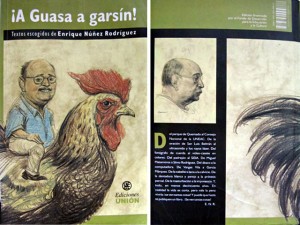“EL VECINO DE LOS BAJOS” CRÓNICAS DE ENRIQUE NUÑEZ RODRÍGUEZ.
Acaba de aparecer un libro de Enrique Núñez Rodríguez. Se titula ‘El vecino de los bajos’ y compila 99 de las crónicas que su autor publicó en la edición dominical de Juventud Rebelde entre 1987 y 2002, que fue el año de su muerte.
La columna que mantuvo en este periódico nutrió casi todos sus libros, desde los muy populares Yo vendí mi bicicleta (1989) y Mi vida al desnudo (2000) hasta los menos recordados Oyee, como lo cogieron (1991) y Gente que yo quise (1995). Pero quedaba mucho material suyo en los archivos del diario, y de allí se sacaron las crónicas que conforman este volumen recién publicado.
Pero, ¿por qué ese título de El vecino de los bajos, que publica Ediciones Unión? Sucede que durante años, Enrique mantuvo su espacio en lo que él llamó el «acogedor sótano» de la página tres del periódico de los domingos, mientras que los «altos» se reservaban a Gabriel García Márquez. Cuando se agotaron las valiosas colaboraciones del autor de Cien años de soledad, la dirección del periódico ofreció «el piso de arriba» a Enrique. Algunos seguidores le instaban a reclamar el espacio que dejaba el colombiano. La antigüedad, la constancia y la larga permanencia en el trabajo —decían los lectores— concedían a Enrique el derecho al ascenso.
El humorista declinó la propuesta de la dirección del diario y desoyó la demanda del público. Adujo que «no es fácil, en el periodismo, acreditar una columna y establecer el hábito, entre los lectores, de buscarla en la misma página y en el mismo sitio». Añadió que era alérgico a las mudadas y que el traslado de sitio dentro de la página no se avenía con su «sedentarismo habitacional». Por último, expresó al director de JR, «que las caídas desde el piso bajo son menos dolorosas».
LAS CRONICAS.
Túpac Pinilla, el nieto de Enrique Núñez Rodríguez, compiló y editó El vecino de los bajos. La gente reclamaba la reedición de los libros del autor, todos totalmente agotados. Luego de bucear en los archivos, Pinilla prefirió sacar a la luz esos 99 textos. Les dio un orden cronológico.
¿De qué tratan esas crónicas? Tratan, sencillamente, de la vida. Son páginas de recreación autobiográfica, de memoria espejeante, de evocación de hechos y personas. Visión incisiva del fluir cotidiano. Peripecias e intimidades del mundo de la farándula, del teatro, la radio y la televisión.
Supo el cronista recoger sin amargura la áspera cotidianidad del período especial y hasta supo hacernos reír en medio del drama de sobrevivir que caracterizó aquella etapa. En las páginas de este libro advierten los especialistas la risa reflexiva y filosófica del humorista. También está presente la voluntad del autor por provocar la risa a secas, de hacernos pasar un rato agradable con lo que escribe, como lo hace en la crónica que titula En el bar, la vida es más sabrosa.
Sucede que Carlos Más, aquel actor que de tanto interpretarlo quedó en el recuerdo como el cesante de la televisión, celebraba su cumpleaños en el bar del restaurante La Roca, y, como invitaba a todos sus compañeros del ICRT que pasaban por el lugar a que lo acompañaran a compartir los tragos, la cuenta crecía y crecía por momentos. Cuando decidió marcharse y buscó la billetera en el bolsillo para pagar lo consumido, comprobó, horrorizado, que no la tenía. Había pedido ya la cuenta, y Richard el camarero se la trajo. Carlos Más le explicó la situación y pidió que le diera un chance para ir a su casa a buscar el dinero. Richard adujo que no había chance alguno, que debía liquidar la cuenta al momento. Rogó Carlos Más, y Richard en sus trece. Fue entonces que el actor, desesperado, exclamó:
—Pero tú me conoces a mí. Yo soy Carlos Más.
Y Richard, sin inmutarse, repuso:
—Y yo soy Federico Engels y me tienes que liquidar la cuenta.
PARA CERRAR ESTOS EXTRACTOS.
A medida que trabajaba en la selección de los textos que conforman El vecino de los bajos, Túpac Pinilla, quien es lector inteligente y crítico agudo, advierte sobre los fetiches de su abuelo a la hora de «trenzar la cuerda», que era como llamaba al acto de escribir —trucos, manías y obsesiones—. Mientras avanzaba tropezaba a ratos con un insistente fragmento que se colaba en cualquier crónica, fuera cual fuera su tema. Aludía al bolerista Pablo Quevedo y decía con ligeras variantes: «Quevedo no grabó discos, y se llevó su voz íntima, pequeña, como para protegerla. Su recuerdo se extinguirá con el último testigo: “Ya Quevedo se ha marchado. De su voz no queda nada”. Y con el último testigo, desaparecerá, también, aquel mito lejano de sonoras campanitas de cristal».
Escribe Túpac: «Era la suya una alerta tierna y seria —y muy pertinaz— sobre la fragilidad de lo efímero, pero su sorpresiva recurrencia me arrancaba la risa. Quiero invitarlos, pues, a que con esa misma risa, tierna y seria, evitemos para Enrique el destino de Quevedo».
El escribidor, con esta página, se suma con modestia a ese propósito.
CiroBianchiRoss/JuventudRebelde/Extractos/InternetPhotos/TheCUbanHistory.com
The Cuban History, Hollywood.
Arnoldo Varona, Editor.
“THE DOWNSTAIR’S NEIGHBOR” CHRONICLES OF ENRIQUE NUÑEZ RODRÍGUEZ.
It have just been published a book of Enrique Núñez Rodríguez. It is entitled ‘The downstair’s Neighbor’ and 99 chronic compiles its author published in the Sunday edition of Juventud Rebelde between 1987 and 2002, which was the year of his death.
The column in this newspaper nurtured kept most of his books from the popular I sold my bike (1989) and My Life Naked (2000) to the less remembered Oyee, as caught (1991) and People I wanted (1995). But his material was much files daily, and from there the chronicles that make up this newly published volume is removed.
But why the title of the downstair’s Neighbor, published Ediciones Union? It happens that for years, Henry kept his room in what he called the “cozy basement” page three of the newspaper on Sunday, while the ‘high’ is reserved for Gabriel García Márquez. When the valuable contributions of the author of One Hundred Years of Solitude is exhausted, the newspaper’s management offered “upstairs” to Henry. Some followers urged him to claim the space left Colombia. Antique, perseverance and long-term employment-readers said Henry granted the right to promotion.
The humorist declined the proposal of the management of the daily and disregarded public demand. He argued that “it is not easy, in journalism, establish a column and establish the habit, among readers of searching on the same page and in the same place.” He added that he was allergic to molted and moving within the page site was at odds with his “dwelling sedentary.” Finally, the director said JR, “which falls from the ground floor are less painful.”
THE CHRONICLES.
Tupac Pinilla, the grandson of Enrique Núñez Rodríguez, compiled and edited The neighbor low. People claimed Reissue author’s books, all completely exhausted. After diving in the archives, Pinilla preferred exposing those 99 texts. He gave a chronological order.
What treat these chronic? Treated simply life. These are pages of autobiographical recreation, shimmering memory, evocation of events and people. Incisive vision of the daily flow. Adventures and intimacies of the world of entertainment, theater, radio and television.
He knew the chronicler collect without bitterness rough daily special period to make us laugh heard amid the drama of survival that characterized that period. In the pages of this book experts warn reflective and philosophical comedian laugh. Author will also present to cause laughter to dry, to make us have a good time with what you write, as it does in the chronicle entitled The bar life is more flavorful.
He succeeds Carlos Mas, that actor was in both interpret the memory as the loss of television, celebrated his birthday at the bar restaurant La Roca, and as invited all his fellow ICRT passing by the place to accompany him to share the drinks, the bill was growing and growing by the minute. When he decided to leave and seek wallet in his pocket to pay for what is consumed, found to his horror that he did not. He had already asked for the bill, and Richard the waiter brought. More Carlos explained the situation and asked to give him a chance to go home and get the money. Richard argued that there was no chance, that should settle the bill at the time. More begged Carlos, and Richard to his guns. It was then that the actor, desperate, said:
‘But you know me. I am Carlos Mas.
And Richard, undeterred, said:
And I’m Frederick Engels and you have to pay the bill right now.
TO CLOSE THESE EXCERPTS.
As I worked in the selection of texts that make up the low neighbor, Tupac Pinilla, who is intelligent and sharp critic reader warns about the fetishes of his grandfather when “braiding rope” as it was called the act of writing-tricks, quirks and obsessions. As he moved stumbled at times with an insistent fragment that seeped into any chronic, whatever was his subject. Paul alluded to bolerista Quevedo and said with slight variations: “Quevedo recorded albums, and took his small, intimate voice to protect. His memory will be extinguished with the last witness: “It has come Quevedo. In his voice there is nothing left. “And with the last witness, disappear, too, that distant myth glass bells sound. ”
Tupac writes: “His was a tender and alert very seriously and persistent-about the fragility of the ephemeral, but its surprising recurrence tore me laugh. I invite you, then, that with that same laugh, tender and serious, to avoid the fate of Enrique Quevedo. ”
The Scriptwriter with this page, adds modestly that purpose.
CiroBianchiRoss / JuventudRebelde / Excerpts/ InternetPhotos / TheCubanHistory.com
The Cuban History, Hollywood.
Arnoldo Varona, Editor.






